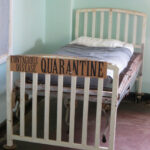Neurological Aftermath of Camp Lejeune: What Survivors Need to Know
In the aftermath of Camp Lejeune's water contamination incident, a significant number of survivors have reported neurological complications. This article elucidates the historical context and scientific findings linking these health issues to exposure at Camp Lejeune.

It explores common neurological conditions suffered by survivors and provides guidance on navigating medical care. Additionally, it outlines the legal rights for affected individuals. A rigorous examination of existing research forms the basis for this comprehensive exploration.
Key Takeaways
- Camp Lejeune incident involved the exposure of service members and their families to contaminated water, leading to major health concerns.
- Long-term exposure to contaminated water is correlated with cognitive impairments and neurological disorders.
- Survivors may experience cognitive deficits, memory loss, mood alterations, and motor dysfunctions.
- Mental health support, legal rights, compensation, and insurance navigation are crucial for survivors to access adequate healthcare and restitution.
Understanding the Camp Lejeune Incident: A Historical Overview

The Camp Lejeune incident, a historical event of notable public health concern, warrants a complete analysis to understand its magnitude and the subsequent neurological implications. This occurrence is illustrative of one of the most alarming military cover-ups in United States history, with far-reaching consequences for those affected.
From the 1950s through to the late 1980s, service members and their families stationed at Camp Lejeune were unknowingly exposed to contaminated water sources. A variety of harmful chemicals including trichloroethylene (TCE), tetrachloroethylene (PCE), benzene, and vinyl chloride were discovered in two major water supply systems within the camp. It was not until the mid-1980s that these contaminants were properly identified and mitigated—decades after initial exposure began.
These toxic substances are known carcinogens and neurotoxins which can trigger severe health conditions and particularly neurological disorders. The latency period between exposure and manifestation of symptoms often spans years or decades and many victims may remain unaware of their affliction until much later in life.
Military cover-ups played an integral part in this tragedy. Despite knowledge of potential contamination dating back as early as 1968, no action was taken immediately to address these concerns nor inform residents about possible exposure risks. Instead, information was systematically withheld from public scrutiny—a decision that has since been severely criticized for its blatant disregard for human health and wellbeing.
The Link Between Camp Lejeune and Neurological Damage: A Scientific Perspective

Scientific research has established a substantial correlation between long-term exposure to contaminated water at the said military base and cognitive impairments. A systematic review of studies on this issue reveals that individuals who resided or worked in Camp Lejeune during the contamination period have shown an increased prevalence of neurological disorders.
The presence of neurotoxic substances such as trichloroethylene (TCE), perchloroethylene (PCE), benzene, and vinyl chloride in the base's drinking water supply is believed to be largely responsible for these health consequences. These chemicals, classified as volatile organic compounds (VOCs), are known to cross the blood-brain barrier and interfere with normal neural functioning. The resultant neuronal damage manifests as cognitive deficits, memory loss, mood alterations, motor dysfunctions, and even more severe conditions like Parkinson's disease.
A study published in Environmental Health Perspectives observed considerable increases in mortality from several neurological diseases among Marine personnel exposed to contaminated water at Camp Lejeune. The findings were consistent across genders and job categories implying a strong association with environmental exposure rather than occupational hazards.
Given these facts, it becomes imperative for survivors experiencing any neurological symptoms to seek immediate medical attention. Furthermore, considering the latency period associated with neurotoxicity, regular check-ups should be encouraged even if no symptoms are present currently.
Common Neurological Conditions Experienced by Survivors

Common conditions experienced by those exposed to the contaminated water include cognitive deficits, memory loss, mood alterations, and motor dysfunctions. These neurological disorders are often severe and debilitating, greatly affecting the quality of life for victims. Neurological Symptoms Recognition is essential in these instances as early diagnosis can lead to more effective management strategies.
Scientific studies have consistently shown a correlation between exposure to contaminants and various neurological symptoms. The volatile organic compounds found in the contaminated water at Camp Lejeune have been linked with neurotoxic effects that manifest as memory impairment, altered mood states and motor dysfunction. Such neurotoxicity was observed even at low-level exposures over prolonged periods, underscoring the insidious nature of this environmental hazard.
Rehabilitation Techniques Overview reveals that interventions typically involve a multidimensional approach aimed at managing symptoms and improving functional capabilities. Cognitive rehabilitation therapy focuses on reestablishing cognitive abilities through specific exercises designed to improve attention span, problem-solving skills, and memory recall capacity.
Physical therapy may be necessary for dealing with motor dysfunctions arising from neuromuscular damage caused by toxic exposure. This could involve strength training exercises or balance training activities depending on the specific issues encountered.
Pharmacological treatment may also form part of management strategy for some patients experiencing mood alterations due to neurotransmitter imbalance resulting from toxic exposure. Antidepressants or mood stabilizers could be prescribed under careful medical supervision.
Overall, adopting an integrated approach towards recognition of symptoms and provision of comprehensive rehabilitative care is critical in addressing the neurological complications arising from exposure to contaminated water.
Navigating Medical Care: Resources and Support for Survivors

Navigating the complex landscape of medical care requires a comprehensive understanding of available resources and support mechanisms for individuals affected by toxic exposure incidents. Two critical components in this process are mental health support and insurance navigation, both of which play significant roles in facilitating adequate healthcare provision.
Mental health support is an essential element in managing the aftermath of toxic exposure incidents. Studies indicate that survivors often experience psychological distress, including symptoms akin to post-traumatic stress disorder (PTSD), depression, and anxiety disorders. Hence, access to mental health services should be considered integral to recovery plans.
Moreover, a plethora of organizations exist that offer counseling services specifically tailored for survivors. These institutions provide a safe space for sharing experiences and strategies to cope with physical ailments as well as emotional trauma resulting from such incidents.
Insurance navigation emerges as another key aspect in this context. The intricacies of insurance policies can often pose challenges for those seeking compensation or coverage for their medical expenses linked to toxic exposures. Assistance from knowledgeable professionals trained in insurance navigation can help clarify policy terms, identify potential coverage gaps, and ensure timely filing of claims.
Specialized programs also exist that assist survivors with navigating the complexities associated with obtaining appropriate health insurance coverage. Such initiatives provide invaluable aid by simplifying what can otherwise be an overwhelming process.
Legal Rights and Advocacy: A Guide for Camp Lejeune Survivors

Understanding legal rights and advocacy mechanisms is crucial for individuals impacted by toxic exposure incidents, providing them with the necessary tools to seek justice and survivor compensation.
The aftermath of the Camp Lejeune incident necessitates a comprehensive understanding of these mechanisms, as they are instrumental in alleviating the burden borne by survivors.
Legal assistance is pivotal in ensuring that victims receive just compensation for damages suffered due to such incidences. Legal professionals specializing in environmental law and personal injury can guide survivors through complex litigation processes, assist in gathering evidence that substantiates claims, and advocate on their behalf during negotiations or court proceedings.
The Janey Ensminger Act of 2012 offers an archetype of legal redress mechanisms available to Camp Lejeune survivors. This legislation acknowledges the government's responsibility for water contamination at the base and provides medical care coverage for fifteen specific illnesses associated with this exposure. However, this does not include provisions for disability benefits or survivor compensation.
In response to this limitation, further legislative action has been taken through the Camp Lejeune Justice Act of 2021. This bill aims to provide recourse for civil actions against responsible parties while establishing a path toward financial recompense for incurred health-related costs.
However, it is noteworthy that despite established legal frameworks, barriers may persist impeding access to adequate restitution. These challenges underscore the necessity of informed advocacy efforts coupled with expert legal assistance - fundamental components critical towards obtaining rightful survivor compensation post-toxic exposure incidents like Camp Lejeune.
Frequently Asked Questions
What Are Some Daily Coping Strategies for Survivors Dealing With Neurological Conditions?
Therapy options for individuals dealing with neurological conditions include physical and cognitive therapies. Stress management techniques, such as mindfulness practices and regular exercise, can also assist in daily coping and overall well-being.
How Can Family Members Best Support a Survivor of the Camp Lejeune Incident?
Support for survivors can be optimized by ensuring emotional stability and implementing therapeutic interventions, which may involve regular psychological counseling, participation in support groups, or engagement in prescribed physical and occupational therapies.
Are There Any Specific Dietary Considerations for Individuals With Neurological Damage?
Specific dietary considerations for individuals with neurological damage often include incorporating dietary supplements as an integral part of neurological rehabilitation to support neural function and overall brain health.
What Is the Projected Long-Term Impact on the Health of Survivors From Camp Lejeune?
The long-term health impact on survivors from Camp Lejeune is projected to include challenges in neurorehabilitation techniques and cognitive impairment management, potentially leading to chronic neurological conditions with varying degrees of severity.
Besides Neurological Damage, What Other Health Conditions Are Camp Lejeune Survivors at Risk For?
Camp Lejeune survivors, besides neurological impairments, face increased cancer risks, including lung and breast cancers. Additionally, toxic exposure consequences may lead to kidney disease, liver damage, and reproductive health issues.
Conclusion
The historical and scientific analysis indicates a strong correlation between exposure to contaminated water at Camp Lejeune and the onset of neurological disorders.
Specialized medical support, legal guidance, and advocacy are essential for survivors. A thorough understanding of this complex situation requires continuous research and awareness among affected individuals.
This knowledge can facilitate informed decisions regarding healthcare management, legal rights, and overall well-being.




